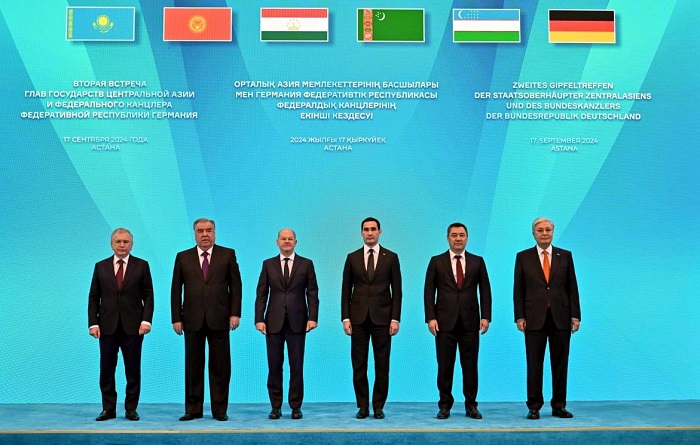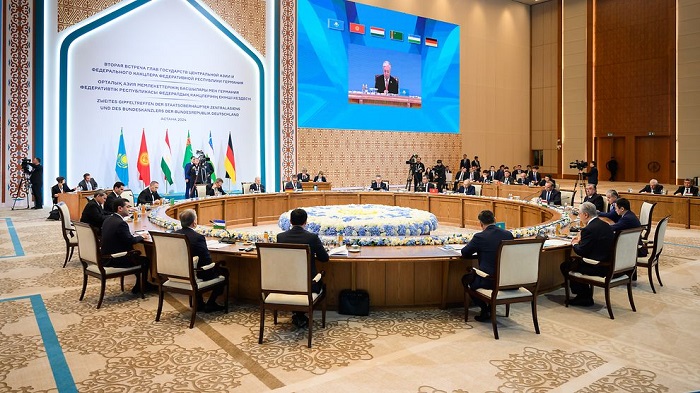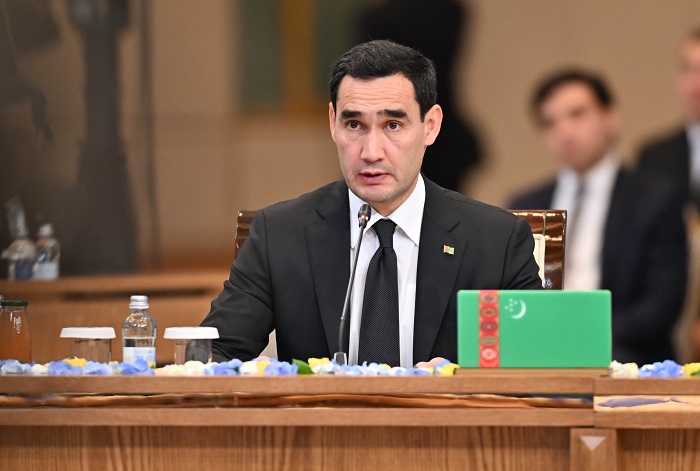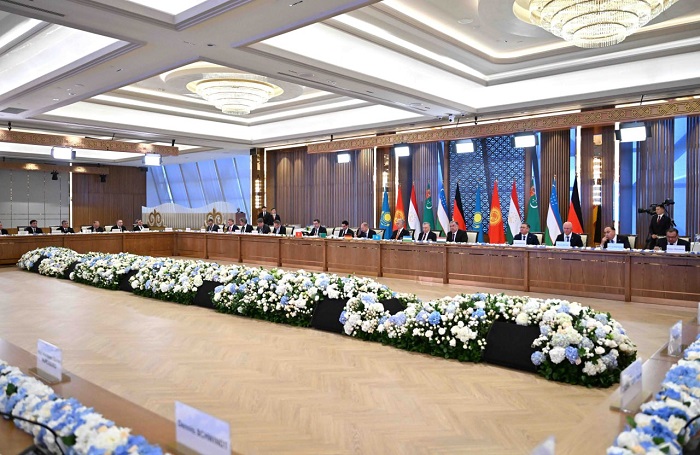The second Central Asia–Germany Summit was held in Astana on Tuesday, 17 September 2024. The meeting was attended by:
• President of Kazakhstan Kassym-Jomart Tokayev
• Federal Chancellor of Germany Olaf Scholz
• President of Kyrgyzstan Sadyr Japarov
• President of Tajikistan Emomali Rahmon
• President of Turkmenistan Serdar Berdimuhamedov
• President of Uzbekistan Shavkat Mirziyoyev
The Heads of State shared their views on the priority areas of economic, political and diplomatic cooperation between Central Asia and Germany.
 Among the variety of opinions and proposals, such areas as developing critical minerals, mitigating climate change, transferring green technologies, fostering investments, building human capacity, and collaborating on counterterrorism efforts were clearly highlighted. In short, these areas represent opportunities for Germany to leverage its expertise and investments to support Central Asia’s transition to a more sustainable and prosperous future.
Among the variety of opinions and proposals, such areas as developing critical minerals, mitigating climate change, transferring green technologies, fostering investments, building human capacity, and collaborating on counterterrorism efforts were clearly highlighted. In short, these areas represent opportunities for Germany to leverage its expertise and investments to support Central Asia’s transition to a more sustainable and prosperous future.
 On the sidelines of the summit, the leaders of Central Asia also met with the heads of leading corporations and companies from Germany.
On the sidelines of the summit, the leaders of Central Asia also met with the heads of leading corporations and companies from Germany.
A Joint Declaration was adopted following the summit.
Speech by President of Turkmenistan Serdar Berdimuhamedov at the second summit “Central Asia – Germany”
Dear Mr. Federal Chancellor, Dear Heads of State of Central Asia!
Ladies and gentlemen! Members of the delegations!
First of all, let me warmly welcome you and express my gratitude to the President of the Republic of Kazakhstan, dear Kassym-Jomart Tokayev, for his hospitality and excellent working conditions.
 Today’s meeting is a significant event, indicating that all participants understand the importance of developing relations, are ready to provide the comprehensive state support, and strive to bring together strong partnership mechanisms. We hope that the results of this Summit will mark a new important stage in strengthening our ties and reaching mutual understanding, reaching concrete agreements.
Today’s meeting is a significant event, indicating that all participants understand the importance of developing relations, are ready to provide the comprehensive state support, and strive to bring together strong partnership mechanisms. We hope that the results of this Summit will mark a new important stage in strengthening our ties and reaching mutual understanding, reaching concrete agreements.
Describing in general the course and content of relations between the Central Asian states and Germany, especially in recent years, I would call them consistent and constructive. We have accumulated experience and traditions of cooperation in establishing mutually beneficial business partnerships mainly at the bilateral level, and intergovernmental channels of interaction are working in a number of areas.
Dear participants!
Among the most important tasks of our joint work, Turkmenistan highlights the achievement and maintenance of regional peace, security and stability. We believe that in the current conditions, closer political and diplomatic cooperation between the countries of Central Asia and Germany can have a noticeable constructive impact on the overall situation in the region and in the adjacent zones. It is necessary to involve the efforts of the world community in this, primarily in the person of the United Nations, drawing upon the shared vision of the leaders of our countries to see Central Asia as a peaceful, calm, economically attractive region, a space of stability and predictability.
For Turkmenistan, as a neutral, peace-loving State, this approach is of fundamental importance. And we are ready to provide comprehensive assistance in achieving this goal, including in the current format. In this regard, we consider it advisable to strengthen diplomatic contacts between the Central Asian states and Germany, placing special emphasis on such topics as the fight against international terrorism, extremism, drug trafficking, and cross-border crime.
Of course, we consider it reasonable and useful to jointly determine the algorithms for working in these areas and in an international format, primarily with the UN and its relevant bodies.
The situation in Afghanistan is among the key issues of peace and security in the region. Our assessment of the situation in this country is based on the fact that today the Afghan people have a chance and real opportunities to overcome a difficult period of many years and transition to creative, nationwide activities to restore state institutions, the economy and the social sphere, achieve and assert peace, harmony and unity in the country.
Dear Heads of Delegations,
The priority of cooperation between the countries of Central Asia and the Federal Republic of Germany is the economy. I am convinced that this area is designed to become the engine of our relations, to ensure strong and stable positions of German business in the countries of the region on the one hand, and on the other – the speedy and effective integration of Central Asia into global economic and investment processes, including through ties with German companies.
Thus, it is obvious that economic, trade, and investment cooperation in our format meets the interests of all its participants and has good prospects for development and expansion.
Among the key areas of partnership, I would identify transport and logistics, communications, energy, industrial production, chemical industry, mechanical engineering, medicine and pharmaceuticals, agro-industrial complex, information technology.
The prospects for economic cooperation between Central Asia and Germany are huge. The advantageous geographical location of our region, connecting Asia and Europe, its vast and diverse natural resources, serious demographic potential, combined with the industrial and technological expertise of Germany, experience and established partnerships in the field of international business, open up great opportunities for our countries to work together.
Issues related to ecology and climate change occupy a special place among the unconditional priorities of cooperation with the Federal Republic of Germany. Turkmenistan highly appreciates the position of the German Government, its commitment to cooperation with the countries of our region, and its active and proactive role in promoting relevant projects and programs.
In this regard, we note the importance of the high-level conference “Green Central Asia” held in Berlin in 2020, where an interested discussion took place and joint steps were outlined.
I suggest we prioritize discussions on environmental sustainability and establish a dedicated focus area within our framework. Let’s develop concrete cooperation plans in this area as soon as possible.
Humanitarian cooperation and human contacts have always had a fruitful impact on interstate relations. And today, I am sure, they are especially in demand and meet the needs and interests of the people of our countries, contributing to the rapprochement and mutual sympathy of our peoples.
I believe that this area should also receive all the necessary state support. In this context, Turkmenistan also notes the importance of developing and encouraging youth cooperation between Central Asia and the Federal Republic of Germany, developing plans and programs for joint activities on a wide thematic range.
I once again express my gratitude to the President of Kazakhstan for the excellent organization of today’s meeting and confirm Turkmenistan’s readiness for the closest cooperation within our format.
Central Asia, Germany Seek Stronger Economic Ties – Ideas from Central Asian Heads of State Federal Chancellor of Germany
Kazakhstan
Kazakhstan, firmly following the formula “Successful Central Asia – successful Kazakhstan”, strives to expand cooperation in the “Central Asia Plus” format. Therefore, a full-scale partnership with Germany, one of the most developed countries in the world and the largest economy of the European Union, is a priority for Kazakhstan and the Central Asian states, President Kassym-Jomart Tokayev said.
Based on common interests, Tokayev presented his vision of the key areas of joint work.
First, trade expansion. Kazakhstan is poised to significantly increase exports to Germany, targeting 100 commodity items valued at $850 million.
Second, energy cooperation. Beyond expanding oil exports, Kazakhstan proposes a joint venture with Uzbekistan and Azerbaijan to construct a green energy transmission line beneath the Caspian Sea, connecting Central Asia to Europe.
Third, industrial partnership. Addressing critical materials, Tokayev advocated for a “raw materials for technology” exchange, with primary and secondary ore processing in the region. He also proposed establishing a Regional Research Center for Rare Earth Metals at the Kazakhstan Center for Technological Forecasting.
Fourth, logistics. Kazakhstan is counting on the interface of the Middle Corridor with the Trans-European Transport Network (TEN-T) and the Global Gateway strategy.
The President addressed the critical topics of green transition and water conservation. He noted Germany’s longstanding role as a trusted partner in combating climate change, environmental protection, and enhancing water and energy efficiency in Central Asia. Moreover, Kazakhstan anticipates Germany’s and region’s support of the initiative to create a Regional center for sustainable agriculture.
Tokayev also invited the scientific and educational circles of Germany to expand cooperation in such promising areas as artificial intelligence, digitalization and “green” technologies.
Germany
“Central Asia has always been an extremely important region for Germany. We can look back on more than 30 years of diplomatic relations and a much longer history. There are German traces everywhere in Central Asia. Conversely, Central Asia’s influence has also reached into Central Europe for centuries, despite all the walls – physical and political – that have separated us for decades”, said Chancellor Scholz.
“Today we can say: the exchange between our societies has never been so close – and it is constantly growing: politically, economically and culturally. We want to continue and intensify this. Because, especially in times of global uncertainty, we need close, trustworthy international partners,” he continued.
Scholz highlighted intraregional cooperation among the important topics of the Astana summit. “It is crucial to addressing challenges such as water scarcity, climate change, issues of connectivity and also social resilience. Because these problems affect everyone and can only be solved together,” he said.
He reaffirmed Germany’s commitment to regional cooperation: “We have learned in our own history how important regional cooperation and integration are – for peace, for prosperity and for good coexistence. So let’s continue to exchange ideas about joint projects that contribute to the stability and sustainable development of the region.”
Uzbekistan
President Mirziyoyev proposed the development of several multilateral programs and the creation of additional mechanisms within the framework of the Central Asia–Germany format.
Thus, the head of Uzbekistan proposed to adopt a long-term Concept for the development of partnership with programmatic activities in priority areas. With this aim it was proposed to establish a Forum of analytical centers “Central Asia – Germany” with its first meeting next year in Khiva.
In order to build up investment and technological partnership, Mirziyoyev supported the idea of developing an appropriate “roadmap”, creating a Council of investors and entrepreneurs “Central Asia and Germany”, as well as exploring the possibility of adopting a multilateral intergovernmental agreement on investment promotion and protection.
Critical minerals became a special topic of the remarks. Uzbekistan is interested in attracting technical assistance from Germany in the implementation of a program to create digital maps of explored deposits of critical minerals and rare earth metals in the region.
Mirziyoyev underscored the importance of cooperation in renewable energy. He proposed establishing an Energy Dialogue involving energy ministries, key corporations, operators, scientific organizations, and industry experts from the six countries. Additionally, he suggested developing a comprehensive program to enhance the expertise of specialists in low-carbon economics, with German technical assistance.
Regarding climate change, Uzbekistan expressed its readiness to actively participate in the German Chancellor’s initiative for a Central Asian Nature Partnership.
Mirziyoyev called the weak development of transport communications, including land and air transportation, the major obstacle to deepening partnership between Central Asia and Germany. He called on Germany to support the involvement of European institutions in developing alternative transport corridors connecting Central Asia to Europe.
The speech also addressed the Afghan issue. Uzbekistan expressed its willingness to collaborate with Germany and other European partners on joint projects aimed at integrating Afghanistan into regional economic cooperation. This includes providing training for Afghan citizens, including girls and women, in skills relevant to a peaceful future. Uzbekistan proposed establishing an Educational Center in the border town of Termez to facilitate these efforts.
Tajikistan
During his speech, President Rahmon drew attention to Tajikistan’s hydropower resources for the production of “green energy”, Tajikistan’s global initiatives to solve global problems such as climate change and its impact, melting glaciers, drought, floods and other problems of the global scale.
He stressed the importance of balanced development of trade, economic and investment cooperation between the countries.
Kyrgyzstan
President Japarov dedicated a significant portion of his speech to the opportunities arising from cooperation between Germany and Central Asia in climate change, technology transfer, and green energy projects.
“Our region possesses all the necessary elements for development: abundant natural resources, including hydropower and various metals, a vast potential for renewable energy, and a dynamic, hardworking, and highly educated population,” he stated.
He emphasized that, in the context of globalization, climate change poses a particular threat to Central Asia, where temperatures are rising at a faster rate than anywhere else on Earth.
As an example, he cited the fact that over the past 70 years, the area of glaciers in Kyrgyzstan has decreased by 16%, and by the end of the century we may lose more than 80% of glaciers. And this is fraught with water shortages throughout the Central Asian region.
Taking into account the attention that Germany pays to the topic of climate change, Japarov proposed jointly with Germany to create a Regional center for the introduction of energy-efficient and resource-saving technologies in Bishkek.
He also supported the German Government’s Green Central Asia initiative. “The transfer of advanced knowledge and technologies within the framework of the initiative will undoubtedly contribute to the effective fight against climate change and the green development of all our countries,” the President of Kyrgyzstan said.
Japarov also addressed the lack of climate finance needed to achieve the Paris Agreement goals. He proposed exploring public debt for “green” projects swaps as a potential mechanism for funding climate and environmental projects.
Continuing his speech, the Kyrgyz President highlighted two major projects requiring investment: the Kambarata HPP-1 and the China–Kyrgyzstan–Uzbekistan railway.
“To expand trade and logistics ties between Europe and Asia, we have launched a strategically important and large-scale project to build the China–Kyrgyzstan–Uzbekistan railway. Its successful implementation will expand the geography of transportation from Asia to Europe, as well as to the Middle East, the Persian Gulf and North Africa,” Japarov said, expressing hope for more active participation of German business in the creation of logistics centers along the new railway route.
In order to institutionalize cooperation between Germany and Central Asia, the President of Kyrgyzstan proposed to hold specialized meetings at ministerial levels in all areas of mutual interest.
Meeting of the Heads of State of Central Asia with representatives of German business
The heads of State of Central Asia and the Federal Chancellor of Germany held a business meeting with the heads of leading German companies to discuss potential partnerships in areas like green energy, manufacturing, logistics, healthcare, agriculture, technology, and more.
 The meeting was organized by the Eastern Committee of the German Economy. German business circles were represented by the heads of such leading companies and banks as KNAUF, Gunter Papenburg, CLAAS, Siemens Energy, Aurubis, Ernst Klett, Siemens Healthineers, Herrenknecht, DB Engineering & Consulting, Svevind Energy, Rhenus, HMS Bergbau. ///nCa, 18 September 2024
The meeting was organized by the Eastern Committee of the German Economy. German business circles were represented by the heads of such leading companies and banks as KNAUF, Gunter Papenburg, CLAAS, Siemens Energy, Aurubis, Ernst Klett, Siemens Healthineers, Herrenknecht, DB Engineering & Consulting, Svevind Energy, Rhenus, HMS Bergbau. ///nCa, 18 September 2024